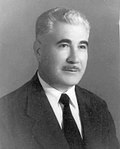List of officeholders
| No. | Portrait | Name (Birth–Death) | Elected | Term of office | Political party | ||
|---|---|---|---|---|---|---|---|
| Took office | Left office | Time in office | |||||
| | |||||||
| 1 |  | Muhammad Najib ar-Ruba'i محمد نجيب الربيعي (1904–1965) | — | 14 July 1958 | 8 February 1963 (deposed) [1] | 4 years, 209 days | Military |
| 2 |  | Abdul Salam Arif عبد السلام عارف (1921–1966) | — | 8 February 1963 | 13 April 1966 (died in office) [2] | 3 years, 64 days | Military / Arab Socialist Union |
| — |  | Abdul-Rahman al-Bazzaz عبد الرحمن البزاز (1913–1973) Acting President | — | 13 April 1966 | 16 April 1966 | 3 days | Arab Socialist Union |
| 3 |  | Abdul Rahman Arif عبد الرحمن عارف (1916–2007) | — | 16 April 1966 | 17 July 1968 (deposed) [3] | 2 years, 92 days | Military / Arab Socialist Union |
| | |||||||
| 4 |  | Ahmed Hassan al-Bakr أحمد حسن البكر (1914–1982) | — | 17 July 1968 | 16 July 1979 (resigned) [4] | 10 years, 364 days | Military / Iraqi Ba'ath Party (Iraq Region) |
| 5 |  | Saddam Hussein صدام حسين (1937–2006) | 1995 2002 | 16 July 1979 | 9 April 2003 (deposed) [5] | 23 years, 267 days | Iraqi Ba'ath Party (Iraq Region) |
| Coalition Provisional Authority (Iraqi Governing Council) | |||||||
| — |  | Jay Garner جاي غارنر (born 1938) Director of the Office for Reconstruction and Humanitarian Assistance of Iraq | — | 21 April 2003 | 12 May 2003 | 21 days | Republican |
| — |  | Paul Bremer بول بريمر (born 1941) Administrator of the Coalition Provisional Authority of Iraq | — | 12 May 2003 | 28 June 2004 | 1 year, 47 days | Republican |
| | |||||||
| — |  | Ghazi Mashal Ajil al-Yawer غازي مشعل عجيل الياور (born 1958) Interim President | 2004 | 28 June 2004 | 7 April 2005 | 283 days | The Iraqis |
| 6 |  | Jalal Talabani جلال طالباني جەلال تاڵەبانی (1933–2017) | 2005 2006 2010 | 7 April 2005 | 24 July 2014 | 9 years, 108 days | Patriotic Union of Kurdistan |
| 7 |  | Fuad Masum فؤاد معصوم فواد مەعسووم (born 1938) | 2014 | 24 July 2014 | 2 October 2018 | 4 years, 70 days | Patriotic Union of Kurdistan |
| 8 |  | Barham Salih برهم صالح بەرهەم ساڵح (born 1960) | 2018 | 2 October 2018 | 17 October 2022 | 4 years, 15 days | Patriotic Union of Kurdistan |
| 9 |  | Abdul Latif Rashid لطيف رشيد لەتیف ڕەشید (born 1944) | 2022 | 17 October 2022 | Incumbent | 3 years, 97 days | Patriotic Union of Kurdistan |
